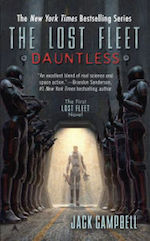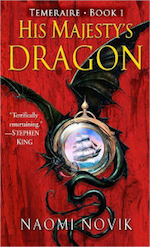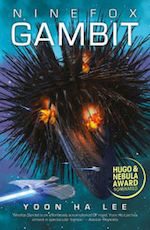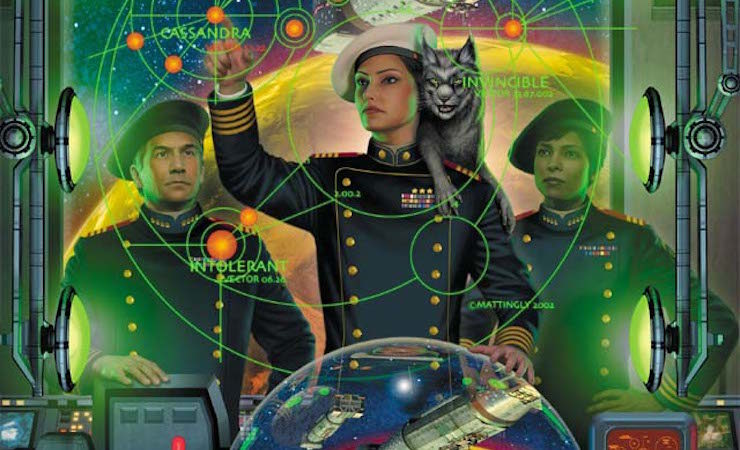Fleets. They might carry brass cannons or photon torpedoes, plucky sailors or space marines, our last hope for victory against an evil empire or just a bunch of murderous assholes with smallpox. Regardless, they fascinate us. Personally, I’ve been intrigued by fleets since I first saw Ben Hur, and now I’d like to share five of my favorite books featuring fleet actions.
H.M.S. Surprise by Patrick O’Brian
 France is out to steal the riches of Asia, but Jack Aubrey knows that’s Britain’s job. Indeed, those riches are already in the holds of British merchant ships bound for home when Admiral Linois, one of Jack’s oldest frenemies, intercepts them with a greatly superior force of French warships. Jack’s H.M.S. Surprise, itself heading home after an aborted mission to deliver an envoy to Kampong, is the only British man-of-war close enough to help. The catch is, the dear old Surprise was only on that mission because she’s small, weak, and ancient, and so can be spared from the war in the Atlantic.
France is out to steal the riches of Asia, but Jack Aubrey knows that’s Britain’s job. Indeed, those riches are already in the holds of British merchant ships bound for home when Admiral Linois, one of Jack’s oldest frenemies, intercepts them with a greatly superior force of French warships. Jack’s H.M.S. Surprise, itself heading home after an aborted mission to deliver an envoy to Kampong, is the only British man-of-war close enough to help. The catch is, the dear old Surprise was only on that mission because she’s small, weak, and ancient, and so can be spared from the war in the Atlantic.
Now Jack’s little frigate must serve as flagship to an under-gunned, under-manned, and often under-captained gaggle of merchantmen as they face off against the most powerful fleet in the hemisphere, in one of the most spectacular age-of-sail naval battles in all of literature.
The Lost Fleet: Dauntless by Jack Campbell
 We’ve all been in embarrassing situations. Admiral Bloch’s is that he rescued a legendary hero from a drifting cryo-pod and promptly suffered a crushing defeat under the man’s nose. Awkward. The hero in question is John “Black Jack” Geary, missing and presumed dead for a hundred years. What do you say to a man like that, when you’re a space admiral with so much egg on your face? Apparently, you say, “You’re in charge now, kthxbye.”
We’ve all been in embarrassing situations. Admiral Bloch’s is that he rescued a legendary hero from a drifting cryo-pod and promptly suffered a crushing defeat under the man’s nose. Awkward. The hero in question is John “Black Jack” Geary, missing and presumed dead for a hundred years. What do you say to a man like that, when you’re a space admiral with so much egg on your face? Apparently, you say, “You’re in charge now, kthxbye.”
So, on his first day at a new job, Geary leads a fighting retreat, pursued by a large fraction of the enemy’s entire navy. Worse, with the way home cut off, the only line of withdrawal leads them deeper into enemy territory. Trapped, demoralized, and with an armada following on their heels, half of Geary’s captains want to surrender while the other half would rather charge the enemy and die in glory. He must bring them to a happy medium between capitulation and suicide, and use every trick he knows to outwit the enemy during a harrowing chase through multiple solar systems.
His Majesty’s Dragon by Naomi Novik
 Again with the French, always trying to subjugate the peaceful, freedom-loving British Empire. And this time, they brought flipping dragons. Prevented by blockade from sailing across the English Channel, Napoleon takes his invasion force over it, carried by squadrons of giant, scaly beasties. Above the waves, they clash with hastily scrambled British dragons in a battle that’s equal parts naval action, aerial dogfight, and ordinary dogfight—all teeth and claws.
Again with the French, always trying to subjugate the peaceful, freedom-loving British Empire. And this time, they brought flipping dragons. Prevented by blockade from sailing across the English Channel, Napoleon takes his invasion force over it, carried by squadrons of giant, scaly beasties. Above the waves, they clash with hastily scrambled British dragons in a battle that’s equal parts naval action, aerial dogfight, and ordinary dogfight—all teeth and claws.
In the thick of it is the dragon Temeraire, along with his rider and BFF, Will Laurence. Taken from the French when he was only an egg (because it turns out the British are, like, super good at stealing things), Temeraire’s abilities are largely unknown, even to himself. For better or worse, education will come swiftly when he’s in a fight for his life and for his adopted home.
The Short, Victorious War by David Weber
 The Star Kingdom of Manticore is at a disadvantage to The People’s Republic of Haven. Compared to its militant neighbor, Manticore has fewer ships, fewer soldiers, and fewer paid holidays per calendar year. Their only advantages are a small edge in some technologies, and a large edge in one Honor Harrington.
The Star Kingdom of Manticore is at a disadvantage to The People’s Republic of Haven. Compared to its militant neighbor, Manticore has fewer ships, fewer soldiers, and fewer paid holidays per calendar year. Their only advantages are a small edge in some technologies, and a large edge in one Honor Harrington.
In The Short, Victorious War, Haven sends a fleet of dreadnaughts to capture Hancock Station, a vital repair base commanded by Honor’s sexytime pal and best human friend, Paul Tankersley—her best friend overall being her cat, Nimitz. It’s still early in the war, so Haven can perhaps be forgiven for falling into one of the two classic blunders in the Honorverse. The first and most famous is “never get involved in a land war on a high-gee planet,” but only slightly less well-known is this: “you mess with Honor Harrington’s loved ones, you die.”
With a task group of relatively puny battlecruisers and support ships, Honor formulates a desperate plan to make the Havenites pay in blood for their near-inevitable victory, and just maybe buy enough time for a relief force to arrive. The plan is thrown into chaos when her admiral is killed and the cohesion of the task group falters, but Honor bypasses two senior captains to take command and steady her fleet. Because she’s Honor Fucking Harrington, that’s why, science fiction’s most audacious weirdo cat lady.
Ninefox Gambit by Yoon Ha Lee
 Stop me if you’ve heard this one: a Hexarchate voidmoth swarm commanded by an undead traitor anchored to the body of a Kel infantry captain flies into the phase transition zone between calendrical stability and calendrical rot, where a guardswarm of bannermoths detonates a radial force multiplier bomb and suddenly outnumbers the Kel swarm by five to one. And that’s not to mention the fortress full of heretics protected behind a shield of invariant ice.
Stop me if you’ve heard this one: a Hexarchate voidmoth swarm commanded by an undead traitor anchored to the body of a Kel infantry captain flies into the phase transition zone between calendrical stability and calendrical rot, where a guardswarm of bannermoths detonates a radial force multiplier bomb and suddenly outnumbers the Kel swarm by five to one. And that’s not to mention the fortress full of heretics protected behind a shield of invariant ice.
One of the greatest achievements of Ninefox Gambit is that all this makes perfect sense in the book. In the Hexarchate, the laws of reality, and therefore the workings and potential of non-invariant technologies, are dependent upon consensus belief. Cheris, the aforementioned Kel captain, shows a talent for understanding zones of heretical belief—a trait which is nearly as troubling to her superiors as it is to her enemies. Jedao, the aforementioned traitor whose undying mind is chained in servitude to the Kel, is an apparent psychopath who murdered his own crew. They forgo the expected path of starring in a sitcom together, instead conducting a space battle that hinges as much upon skill with math as it does on force of firepower, and every moment is as beautiful as it is horrifying.
 Robyn Bennis is a scientist living in Mountain View, CA, where she works in biotech but dreams of airships. Her debut novel, The Guns Above, is available now from Tor Books.
Robyn Bennis is a scientist living in Mountain View, CA, where she works in biotech but dreams of airships. Her debut novel, The Guns Above, is available now from Tor Books.










